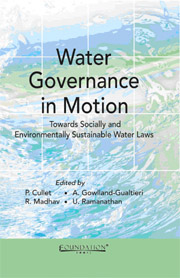Book contents
- Frontmatter
- Contents
- Acknowledgments
- Contributor Biographies
- Introduction
- I Water Law, Policy and Institutional Reforms in India
- II Ongoing Irrigation and Ground Water Reforms in India
- III Perspectives on Privatisation
- IV Environment and Human Rights
- 12 Balancing Development and Environmental Conservation and Protection of the Water Resource Base: The ‘Greening’ of Water Laws
- 13 The Right to Water as a Human Right or a Bird's Right: Does Cooperative Governance Offer a Way Out of a Conflict of Interests and Legal Complexity?
- 14 South Africa's Water Law and Policy Framework: Implications for the Right to Water
- 15 Respect, Protect, Fulfill: The Implementation of the Human Right to Water in South Africa
- V Comparative Perspectives on Reforms
- Bibliography
14 - South Africa's Water Law and Policy Framework: Implications for the Right to Water
from IV - Environment and Human Rights
Published online by Cambridge University Press: 26 October 2011
- Frontmatter
- Contents
- Acknowledgments
- Contributor Biographies
- Introduction
- I Water Law, Policy and Institutional Reforms in India
- II Ongoing Irrigation and Ground Water Reforms in India
- III Perspectives on Privatisation
- IV Environment and Human Rights
- 12 Balancing Development and Environmental Conservation and Protection of the Water Resource Base: The ‘Greening’ of Water Laws
- 13 The Right to Water as a Human Right or a Bird's Right: Does Cooperative Governance Offer a Way Out of a Conflict of Interests and Legal Complexity?
- 14 South Africa's Water Law and Policy Framework: Implications for the Right to Water
- 15 Respect, Protect, Fulfill: The Implementation of the Human Right to Water in South Africa
- V Comparative Perspectives on Reforms
- Bibliography
Summary
Introduction
The post-apartheid reforms in South Africa which put into place the existing water framework were intended to redress the disparities inherited from the prior racial segregation policies. Apartheid had entrenched stark inequalities between black and white communities also in the face of access to water, while the natural scarcity of national freshwater resources in South Africa also contributes to diminishing availability of water and increasing competition between the various users. Consequently, water reform policy and water justice became a central aspect of the new Government's policy of reconstruction and development and indeed remain very topical issues today. The right to water was entrenched in the constitution adopted in 1996 and in subsequent legislation, and its implementation was furthered a few years later by means of a policy of ‘free basic water’ adopted by the government.
The South Africa experience is interesting in that it sheds light on developments taking place in the context of renewed interest for the formalisation of a right to water in international law as well as in the national legal orders of a growing number of countries. While on the one hand the implementation of the right has resulted in the development of a policy of free entitlement to water for consumption and domestic use, there remain in South Africa huge disparities in access to basic water services and allocation of water, mostly as a legacy from the apartheid regime but also as the result of the application of an essentially economic approach to water policy.
- Type
- Chapter
- Information
- Water Governance in MotionTowards Socially and Environmentally Sustainable Water Laws, pp. 388 - 414Publisher: Foundation BooksPrint publication year: 2010
- 1
- Cited by

